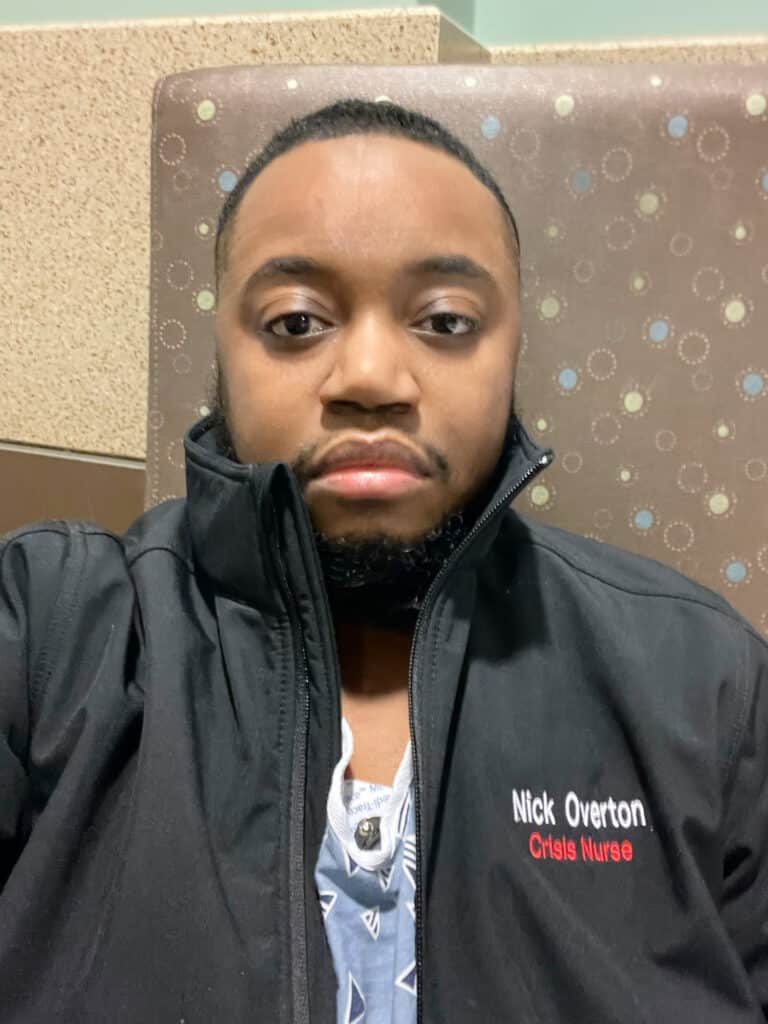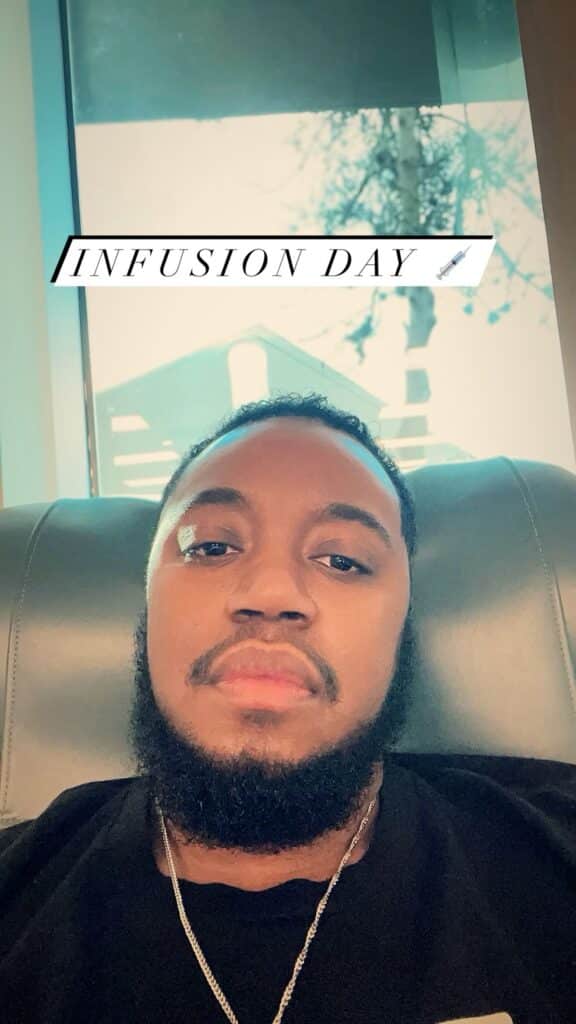
Choose Your Language:
Posted by: The Sumaira Foundation in NMO, Patient, Voices of NMO

On January 30, 2023, I was diagnosed with relapsing-remitting multiple sclerosis following the onset of nearly complete vision loss in my left eye.
As a nurse, I had learned about and taken care of multiple sclerosis (MS) patients, but I was not the nurse anymore. Now I was the patient. Being African American and presenting with brain, cervical, and thoracic cord lesions, this suggested the possibility of a more aggressive disease course. As a result, I sought the expertise of an MS specialist, a process that entailed a six-month wait for my initial appointment. Meanwhile, under the care of a local neurologist, I started treatment with a high-efficiency disease modifying therapy (DMT). Despite this intervention, I had two relapses necessitating hospitalization. During my most recent hospital stay, MRI findings suggested the possibility of neuromyelitis optica spectrum disorder (NMOSD). I have brain stem lesions in the postrema area, the obex, and the left pons. The radiologist was also concerned about longitudinal extensive transverse myelitis (LETM). That was hard for him to verify due to image quality.
Determined to advocate for my health, I requested specific diagnostic tests, including AQP4 IgG and MOG IgG serum via cell-based assays, as well as a spinal tap. These are very helpful in making the diagnosis of NMOSD or MOGAD (myelin oligodendrocyte glycogen antibody disease) which may present similarly to MS. Regrettably, my MS neurologist declined these requests despite my lack of response to high-dose steroid therapy and my deteriorating neurological symptoms. By this point, I had become numb in both lower extremities, both upper extremities, genitals, and was incontinent of both bowel and bladder.
Recognizing the necessity of proactive intervention, I sought expertise beyond my current provider, ultimately finding a knowledgeable neurologist specializing in NMOSD through The Guthy-Jackson Charitable Foundation’s website. The meeting with the new neurologist was a totally different experience and approach to my medical care. For the first time since my diagnosis, I felt safe, heard, and cared for not only as a patient, but as a human being. The compassionate and thorough care provided by him offered reassurance and clarity. He did a comprehensive evaluation revealing insights into my condition. Because I am AQP4 negative, I am considered seronegative, which comes with its own challenges when diagnosing and is not as straight forward as a patient that tests positive for AQP4-IgG or MOG-IgG. The visit with the specialist and his team lasted 3 hours. This was the first time since my diagnosis that I’ve had a proper neurological exam. He was meticulous in reviewing MRI scans and looking at every image from January 2023 to my new images in March 2024 and explained every diagnostic finding, which I had been denied before.

This instilled confidence and trust in my medical team and treatment plan. That plan has since been adjusted to address the indications of NMOSD. The doctor also found a longitudinal extensive lesion on my right optic nerve and optic chiasm that was missed on the radiologist report. I am hopeful that my new treatment plan will keep me relapse free moving forward. I have been on B cell depletion therapy since April 2023 and my new neurologist also added a drug known as CellCept. This drug is used to provide an additional layer of immunosuppression in hopes of minimizing the frequency or intensity of future relapses.
In response to my diagnosis, I have used this opportunity to advocate for greater awareness, inclusivity, and support within the NMOSD community with a special focus on the seronegativity (NMOSD) and MS communities. Having a background in humanitarian nursing, I asked myself how I could use my diagnosis as a way to help others with chronic illnesses? How could I bring awareness so others did not go misdiagnosed for years? During my hospitalization, I initiated contact with the Multiple Sclerosis Foundation’s Facebook group, seeking support and guidance following my diagnosis in January 2023. It was within this virtual community that I crossed paths with Cherie Binns, RN, MSCN, with whom I forged a meaningful connection rooted in our shared dedication to nursing. Subsequently, expressing my interest in deepening my understanding of my diagnosis and aspiring to attain certification as a Multiple Sclerosis Certified Nurse, Cherie graciously assumed the role of a mentor.
As I continued my research and advocacy work, I identified a notable gap in representation within the MS community, particularly pertaining to the LGBTQIA+ demographic.
One of my first thoughts after my diagnosis was whether I would have to stop my gender-affirming hormone therapy. How would it impact my disease progression? Having been born female, I take testosterone to align more with the masculine gender with which I identify. I began to research the topic and found considerable lack of information or research on the topic. To this date there’s still not much information available to transgender individuals regarding the impact of gender affirming care and any impact on long term health or chronic illness. To help mitigate the gap in LGBTQIA+ representation I collaborated with the Multiple Sclerosis Foundation to help organize a support community for LGBTQIA+ individuals diagnosed with multiple sclerosis. I currently moderate that group and am also a part of their lived experience advisory panel.
Furthering my commitment to advocacy and awareness initiatives, I joined the work of other organizations. I serve as a patient stakeholder for PCORnet (Patient-Centered Outcomes Research Network) and filled the role of consumer reviewer for the Department of Defense’s (DOD) Congressionally Directed Medical Research Program’s (CDMRP) Multiple Sclerosis Research Program (MSRP). Encouraged by these experiences. My journey with my diagnosis has been one marked by profound challenges and transformative experiences.

As a nurse turned patient, I navigated the complexities of my condition, seeking specialized care amid delays and setbacks. The pivotal moment came when I found compassionate and thorough support from a knowledgeable neurologist specializing in NMOSD. He offered me not only medical expertise, but also a sense of safety and understanding. Through proactive intervention and advocacy, I have embraced opportunities to raise awareness and promote inclusivity within the LGBTQIA+ and MS communities. My focus has been on research and the potential impact of gender-affirming therapy on disease progression. By leveraging my background in nursing and forging meaningful connections within various organizations, I have actively contributed to research, support networks, and awareness initiatives.
Moving forward, I am committed to continuing my advocacy efforts within the NMOSD community, striving for meaningful change, and fostering a greater understanding and support for those impacted by these conditions.